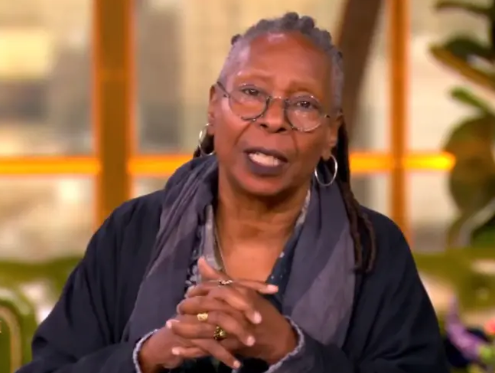Whoopi Goldberg, the outspoken co-host of The View, recently made a candid confession about her motivations for staying on the long-running talk show. During a discussion on the struggles of the working class, the 68-year-old comedian and actress revealed that, if she were wealthier, she wouldn’t be a part of the show. “I appreciate that people are having a hard time. Me too. I work for a living,” she said, resonating with countless Americans facing financial challenges in today’s economy. Goldberg’s comments provide a rare glimpse into the reality of working in the entertainment industry and highlight the tension between celebrity wealth and real-life responsibilities.
Whoopi’s Confession: “If I Had All the Money in the World, I Would Not Be Here”

Goldberg’s comments came during a Hot Topics segment on The View focused on the economic challenges facing Americans. Addressing both her co-hosts and the studio audience, Goldberg admitted, “If I had all the money in the world, I would not be here, OK? So, I’m a working person, you know?” Her statement reflects a surprising sentiment coming from a Hollywood star, as many viewers might assume that someone in her position is financially secure enough to work solely by choice.
This confession is notable not only for its honesty but also for the relatability Goldberg expressed. She reminded the audience that, despite her fame, she still works to support her family. “My kid has to feed her family. My great-granddaughter has to be fed by her family. I know it’s hard out there,” she continued. Her words underscore a reality for many Americans who, despite years of hard work, feel the ongoing pressures of supporting multiple generations.
Whoopi’s Long Journey on The View
Whoopi Goldberg has been a fixture on The View since 2007, making her the longest-serving co-host in the show’s history. Over the years, she has become known for her bold opinions, quick wit, and willingness to address controversial topics head-on. Her tenure on the show has been marked by both praise and criticism, with fans admiring her outspokenness and critics often challenging her views. Goldberg’s recent remarks offer insight into what keeps her motivated: providing for her family and relating to the struggles faced by ordinary Americans.
Her tenure hasn’t been without its conflicts. Goldberg frequently clashes with other co-hosts and sometimes sparks heated debates that make headlines. Nevertheless, her comments this week suggest that, despite the drama, Goldberg remains on The View because of her financial obligations—a reality that is all too familiar to many of her viewers.
Speaking Out on Grocery Prices: “The Folks That Own the Groceries Are Pigs”
Goldberg’s recent remarks on inflation and grocery prices have also stirred controversy. Just days after Donald Trump’s presidential campaign focused heavily on inflation, Goldberg claimed that rising grocery prices were not the fault of the Biden administration or the economy as a whole. Instead, she directed her frustration toward grocery store owners. “Your pocketbook is bad, not because the Bidens did anything. Not because the economy is bad. Your grocery bills are what they are because the folks that own the groceries are pigs,” she said on the show.
Her statement instantly sparked backlash, particularly from the grocery industry. The National Grocers Association (NGA), representing over 21,000 grocery stores nationwide, took issue with Goldberg’s words. In a letter to The View’s executive producer Brian Teta, NGA Chief Executive Greg Ferrara expressed concern, saying, “We are deeply troubled by these remarks … referring to people who own grocery stores as ‘pigs.’” Ferrara explained that grocery stores operate on “razor-thin” profit margins, often between 1% and 2%, and that grocers are unfairly blamed for rising prices, which are actually driven by larger economic factors, including labor and supply chain costs.
Industry Outrage: Grocers Speak Out Against Goldberg’s Comments

The backlash from the grocery industry was swift and intense. Small business owners, especially those running family-owned stores, felt targeted by Goldberg’s statement. Zulema Wiscovitch, who co-owns two grocery stores in New York City, voiced her frustration in an interview with The New York Post. “It shows a lack of understanding of what’s going on with the economy,” Wiscovitch said, adding that the viral clip of Goldberg’s comment had caused outrage in the grocery community.
She explained that grocery store owners are also grappling with inflation and that costs have risen at every level of the supply chain. “Grocers are paying higher prices from manufacturers,” Wiscovitch said. Many store owners feel they are being unfairly vilified, with Goldberg’s comments even inciting anger among customers. The National Grocers Association echoed these concerns, stating that this type of rhetoric increases the risk of harassment and violence toward retail employees, who have been essential workers throughout the pandemic.
Understanding the Real Causes of Food Inflation

While Goldberg’s comments may resonate with those frustrated by higher grocery prices, experts point to broader economic factors as the true cause of food inflation. Rising labor costs, supply chain disruptions, and higher prices from manufacturers all contribute to the increased cost of goods. The grocery industry argues that these issues are out of the control of individual store owners, who are doing their best to keep prices affordable despite tight profit margins.
Ferrara, of the NGA, explained that the pandemic led to significant disruptions in the food supply chain, causing prices to increase across the board. “Statements that falsely depict grocers as ‘gouging’ not only exacerbate these tensions but also risk further harm to these frontline workers,” he stated. By directing public anger toward grocery store owners, critics argue, Goldberg’s comments oversimplify a complex issue that affects everyone along the supply chain.
Whoopi’s Relationship with the Working Class: Empathy and Controversy
Goldberg’s comments highlight her complex relationship with the American working class. On one hand, her candid remarks about working to support her family resonate with viewers who face similar struggles. Many Americans relate to the pressure of balancing work, family, and financial obligations, especially in today’s economic climate. Goldberg’s honesty about her motivations adds a layer of authenticity that is rare among celebrities.

However, her criticisms of grocery store owners reveal a potential disconnect. While her frustration over rising costs is shared by millions, her focus on grocery stores as the cause of inflation has sparked pushback. This controversy raises questions about whether Goldberg’s empathy for the working class is sometimes clouded by misunderstandings of economic realities.
Conclusion: Whoopi Goldberg’s Remarks as a Reflection of Broader Frustrations
Whoopi Goldberg’s recent statements on The View—from her candid confession about working to support her family to her controversial remarks on grocery prices—reflect the broader frustrations felt by many Americans today. Her willingness to speak openly about her financial motivations resonates with a nation where countless people work to provide for their families. In sharing her reality, Goldberg bridges the gap between celebrity and viewer, offering a rare glimpse into the financial pressures faced even by those in the public eye.
At the same time, her comments about grocery store owners underscore the complex landscape of food inflation and economic challenges. While her remarks have struck a chord with some, they have also sparked criticism from an industry already grappling with rising costs and public scrutiny. Goldberg’s words remind us of the need for nuanced discussions on economic issues, where frustrations are channeled constructively without vilifying essential workers and small business owners.
As the conversation continues, Whoopi Goldberg’s voice remains a powerful one, sparking debate and bringing attention to issues that impact everyday lives. Whether one agrees with her or not, her candid approach encourages viewers to consider multiple perspectives in the complex and interconnected world of economics, labor, and family life.


